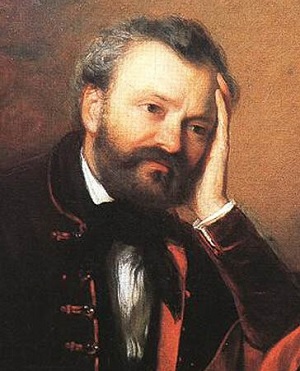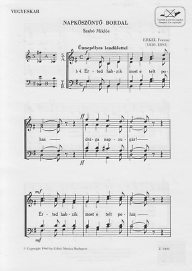
Composer, concert pianist, conductor and teacher, the most important representative of Hungarian romanticism apart from Liszt, and creator of Hungarian language national opera.
Biography
He was born in Gyula on November 7, 1810. His grandfather, József Erkel (1757–1830) was a music teacher and church organist in Pozsony and later in Gyula; his father, József Erkel jr. (1787–1855) was active in Gyula as a church choirmaster and conductor. He studied piano and music theory first in his hometown under the guidance of his father and grandfather, then during his school years (1822–25) at the Benedictine secondary school in Pozsony, he was taught by the excellent composer Henrik Klein. His musical taste was strongly influenced by hearing on several occasions the playing of the band led by the famous Hungarian gipsy violinist János Bihari.
From 1823 to 1834 he lived in Kolozsvár, where he worked as a music teacher, gave concerts as a pianist and composed pieces for the piano. It was in this period that he began conducting, and his interest in opera also dates from this time. In 1834 he performed for the first time in Pest; from 1835 he was conductor of the National Playhouse, which operated in the Castle theatre; in 1836–37 he was second conductor of the German Municipal Theatre of Pest, where the works he conducted included items from the Italian and German repertoire of the time. In addition he also gave concerts as a pianist: his name is associated with the first performance in Pest of Chopin’s E Minor Piano Concerto (1835) and (together with the violinist L. Jansa) of Beethoven’s Kreutzer Sonata; his repertoire included not only the major classical compositions for piano but also works by his European contemporaries (including Field, Herz, Hummel, Kalkbrenner, Moscheles and Thalberg).
In 1839 he married Adél Adler, and from their marriage four outstanding musicians were born: Gyula, Elek, László and Sándor. In January 1838 – as successor to József Heinisch – he was appointed first conductor of the Hungarian (later the National) Theatre, which had been operating for just a few months. In the three decades that followed – until the opening of the Budapest Opera House (1884) – he became the creator of Hungarian opera and its leading personality. As director of the opera company functioning within the framework of the National Theatre, he did much to familiarize audiences with the latest European operatic works and to develop the Hungarian opera repertoire: he conducted first performances of numerous works by his Hungarian contemporaries and also compositions of his own.
His active connection with the theatre directed his interest as a composer towards theatrical works. His first opera, Bátori Mária, which despite the stylistic features of the time that undeniably reveal Italian models is justly celebrated as the first national opera, had its premiere on August 8, 1840, in the Hungarian Theatre, which was then named the “National Theatre”. The librettist, Béni Egressy, until his death in 1851 remained Erkel’s most important collaborator. In 1844 they premiered the opera Hunyadi László, the most significant opera of the reform period, some of the tunes from which became in 1848 nation-uniting pieces of music in the struggle for freedom, comparable in their effect only with the Rakóczi March.
In 1844 a work by Erkel won first prize in the anthem competition advertised by the director András Bartay, and since then it has been Hungary’s national anthem. After the failure of the freedom struggle, he composed incidental music for a number of theatrical works on popular Hungarian themes (Two Pistols, The Jew, The Prisoner, The Secrets of a Wardrobe), and did much to enliven the musical life of the capital.
Under his direction the Budapest Philharmonic Orchestra was formed in 1853; he conducted it regularly and directed it as leading conductor until 1874; in 1858 he was appointed leading conductor of the National Hungarian Choral Association, and this post inspired him to compose a number of choral works. In the 1850s he composed his most important opera, Bánk bán, which was first staged only in 1861. His sons played a significant part in the creation of his later works for the theatre (Sarolta, 1862; Dózsa György, 1867; Brankovics György, 1874; Nameless Heroes, 1880 and King István, 1885). Relying primarily on Italian and French examples and making use of 19th-century Hungarian verbunkos music, he developed an integrated national operatic language which he combined with librettos taken from Hungarian history, creating works of lasting national and musical value.
Besides his activities as a composer and conductor he undertook a major role in the development of 19th-century Hungarian musical institutions; without his historically important founding activity the 20th-century flourishing of Hungarian music would hardly have been imaginable. He took part in the establishment of the Academy of Music (1875), where for ten years he was the principal and also taught piano. In 1884 he was honoured with the title of principal musical director of the new Budapest Opera House.
In 1890, on his 80th birthday, he appeared for the last time on the podium conducting a concert given by the Philharmonic Orchestra. Erkel was an internationally acknowledged chess player as well, and a founder of the Budapest Chess Club. He died in Budapest on June 15, 1893.
For the 200th anniversary of the Hungarian composer Ferenc Erkel, EMB issues the piano reduction of his opera arias in digital format.

 Deutsch
Deutsch English
English Español
Español Français
Français Magyar
Magyar Polski
Polski Slovenský
Slovenský Slovenščina
Slovenščina 中文
中文













